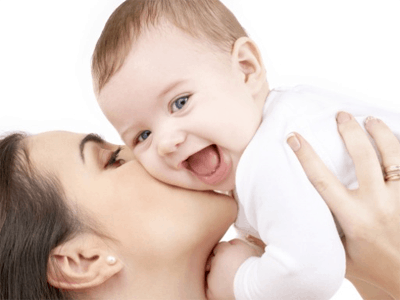
Postpartum Hair Loss After Pregnancy and Childbirth
During pregnancy, you may have been thrilled with your thick and lustrous mane of hair. Except for some dryness, you may have thought, wow, pregnancy has finally given my hair some life! But then once you have your baby — poof! You’re alarmed, even shocked, to find that your hair seems to be falling out
It is common for women to notice many different changes to their bodies during pregnancy. While some may notice that their hair seems to grow better while they are pregnant, others worry that they will lose hair during this time. Is pregnancy the culprit to hair loss? Here are some of the things that you should know about how pregnancy may affect your head of hair.
Does Pregnancy Cause Postpartum Hair Loss?

Hair loss generally does not occur during pregnancy. If you notice yourself losing a lot of hair while you are pregnant, it is likely due to a preexisting condition. Changes in hormones that take place during pregnancy do not cause women to experience hair loss during this time. Some women may notice a reduction in hair loss while they are pregnant because taking certain medications, like birth control pills, can cause the problem. It is common for hair loss to occur three to four months after delivery, according to the American Pregnancy Association. The good news is that hair loss related to pregnancy generally does not last long enough to cause baldness or patches.
How Long Does Hair Loss Last After Pregnancy?
Postpartum hair loss occurs after pregnancy generally starts about three months after delivery and usually stops by the fourth month. Thus, pregnancy-related hair loss may last a total of two months. If hair loss continues after this point or if it seems to be significant, be sure to talk to your doctor and hair loss expert. There is likely another reason you are losing hair, whether it is genetics or a vitamin or nutrient deficiency.
What Causes Pregnancy-Related Hair Loss?
When hair loss occurs shortly after pregnancy, it is due to estrogen hormonal changes. During pregnancy, you experience an increase in estrogen. Shortly after pregnancy, your hormones levels will return to their original state, which is why hair loss is common during this time.
There are a few other circumstances when estrogen levels change and hair loss may occur. This includes when you go off a birth control pill or another form of contraception, when you have an abortion or miscarriage, or if you have a hormonal imbalance, according to the American Pregnancy Association.
Overall, it is important to keep in mind that hair loss generally does not occur while you are pregnant.
If you feel that your hair loss is greater than the norm, or if things are not back to normal by the time your baby is 12 months old, then see your doctor. Excessive hair loss can be caused by common and easy-to-remedy postpartum conditions such as hypothyroidism (low thyroid hormone) or iron-deficiency anemia. Guci Image with over a decade of experience treating medically related hair loss is only a call away.
4 Tips & Tricks For Postpartum Hair Loss
1. Skip Styling Your Hair-
Styling your hair with a dryer or curling iron may make Your Hair look thinner. Try to hold off on fancy styles and let your Hair Air Dry.
Brushing your hair too hard can cause your hair to fall out in bigger clumps, so be gentle and don’t brush more than once a day.
2. Nutrition –
Eat A variety of fruits, vegetables, and healthy proteins in your diet is the best way to make sure your body is getting all the nutrients it needs.
Foods to improve hair healthiness include dark leafy greens (for the iron and vitamin C), sweet potatoes and carrots (for the beta carotene), eggs (for the vitamin D), and fish (for omega-3s and magnesium).
3. Make Sure you Take your Vitamins-
Vitamins shouldn’t be a substitute for a diet. But they may help as a supplement if your diet is not well-balanced. While no specific vitamins have been shown to affect hair loss, they are important for your overall health. Continue Using Prenatal Vitamins after your baby is born, especially if you are breast-feeding.
4. Be Cautious of Using Volumizing Shampoos –
Make sure to be Cautious with Certain Conditioners & Shampoos They May sometimes weigh your hair down and make it look thinner. Volumizers can add body to your hair and help maintain a luxurious look.
To Learn More Visit- https://www.todaysparent.com/baby/postpartum-care/why-postpartum-hair-loss-is-totally-normal-and-how-to-stop-it/
The right treatment for you
Whether you are you are looking for something Non-surgical or Surgical, we offer a hair restoration solution that fits you.

